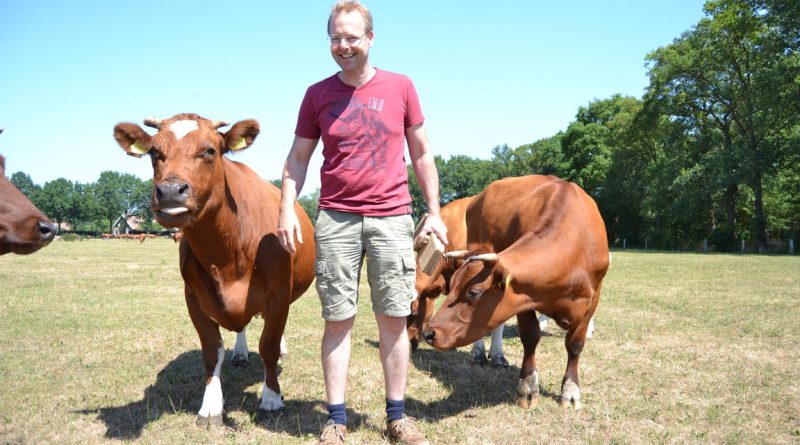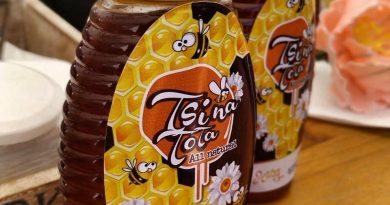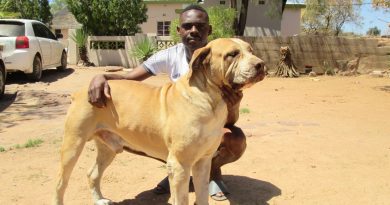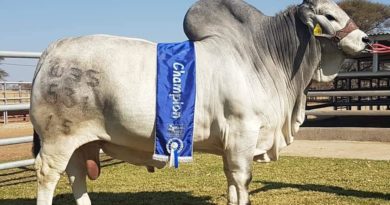Farming with Nature in Twente
With a total surface area of about 4.15 million hectares, the Netherlands ranks among the smaller countries in Western Europe. With just over half land dedicated to agriculture, the Dutch soils are consequently under pressure. Therefore it is imperative that everything is done to ensure that the country’s nature areas and agricultural land is safeguarded to provide for future generations.
There are roughly 170 farms that produce organic beef in the Netherlands. Although Dutch organic beef production is in decline, consumer demand for beef from organically raised cattle is growing.
Dennis, together with his wife, Annette van Gaalen, manage Erfgoed Bossem, a family farm located in Lattrop in Twente, which was established several centuries ago. Twente, is a region located about 1.5 hours away from Amsterdam in the east of the Netherlands.
Dennis is the fifth generation to manage the farm. As can be expected, production methods on the 2.2 hectare farm changed over the years and Dennis, who tried veal farming at one point, completely moved to organic farming about 11 years ago.
The farm now comprises of the rare red-colored beef Brandrode rundren dual purpose cattle. Erfgoed Bossem is not an ordinary beef farm. The family also offer guest accommodation on their farm.
Dennis has a partnership with nature reserve organizations which has given him access to over 70 hectares that offers natural grazing to his cattle.
” There is a lot of nature in Twente. People from the city were coming over to camp and do other outdoor activities. ” He explains
In fact Dennis decided to move from veal to organic farming after seeing a lot of people visit his area. On top of that, he was driven to organic farming by the need to preserve the earth for future generations.
According to Dennis the farm has about 150 Brandrude cattle, 2 bulls and about 60 cows graze together at a go. “Breeding is done on the farm, We don’t buy calves. ” He says. He notes that the farm is self supporting. Almost everything is from the farm. Meat, milk. The farm slaughters about 60 animals a year.
Organic accreditation
There is a kitchen and restaurant on the farm and this allows the farm to get a return on investment on their pasture raised beef.
“We get about €4.30 per kilo when we sell to nature farmers but when I sell in my restaurant we make up to €4000 per an animal. ” He elaborates
He goes on to explain that some of the renowned hotels and restaurants in the Twente region have been regular customers for years. They also sell directly direct to consumers.
Dennis says that unlike in the olden days where farmers were only concerned with producing food and other agricultural related produce, farming has changed nowadays, it involves marketing. Nowadays farmers don’t just produce goods, they need to find a way to sell them.
“Before you even spend a cent on production, you must have consumers for your product.” Dennis emphasizes.
Erfgoed Bossem is a member of Slow Food. According to the organization’s website, members of this international movement of ecogastronomy, with close to 100,000 members in over 160 countries, are of the opinion that food should be tasty, pure and should be produced ethically. It envisions a world in where all people can access and enjoy food that is good for them, good for those who grow it and good for the planet.
Most importantly, Food must be produced without damaging the environment. On top of that, The organization also advocates fair prices for consumers, fair compensation of farmers for their work as well as adherence to high standards when it comes to animal welfare and health issues on member farms.
Dennis says that everything that they do is audited for quality and to ensure that it is indeed organic. They are assessed once in every three years to ensure that they stick to standards and they auditors can come to member farms at any time, unannounced.
“There is also a Brandrude corporation called nature farmers. We slaughter together. We have some supermarkets that we distribute to. We operate under European rules. “
Breeding
When he switched from veal farming, Dennis also had to change the design of the barn and stables to cater for organic farming. Unlike in the past, the cattle now spend most of the time out in the pasture during the day and come in at night. They only come to stay in the barn a few weeks before slaughter.
The situation however is different during winter as they all stay in the shed until March when calves go outside followed by cows with calves in April.
Rerink says that they prefer the Brandrude because they their feed conversion rate is great especially for growth. Although Brandrude is a dual purpose breed, Dennis reckons that it is not that great on the milk side. “We have two bulls for breeding and every year we change one breeding bull. But it depends, if the other bull is not good enough for our program we change them both.”
As an organic farm, Erfgoed Bossem does not practice artificial insemination. They let nature take its course. “We also don’t milk them cows. Milk is for the calves. ” Says Dennis.
He goes on to explain that they keep all the of springs. The nature reserve pastures are not free. Dennis has to pay to put his cattle on them, But he explains that rent is way cheaper as compared to if he was to rent out a farm from a colleague or government.
“we are currently negotiating with nature organizations to see how best we can work together. Nature needs farmers and farmers need nature so we have to come up with a sustainable working relationship. ” Emphasizes Dennis.
Raising cattle this way takes a bit of time as compared to under an intensive system. But Dennis believes it’s worth is as when a consumer tastes the meat, it is marvellous.
“They are only fed grass and grain that they grow on their own land. All the feed is grown on the farm. Grass and grain which is barley. Says Dennis.
The cattle are slaughtered at about 320-330kg at about 30 months at a slaughtering facility which is about 5km from the farm.
Accommodation
Erfgoed Bossem offers three types of accommodation, Star cubes , Lodge tents and Farm suites. The accommodation offers experience similar to that of an African safari. The only difference being that instead of waking up to the sound of lions and elephants, when you wake up open and your tent at farm, you are come face to face with impressive fire-red beef cattle. All the accommodation, about 80 beds in total, is booked throughout the year and offers “5 star” treatment similar to staying in a hotel. It has employees who do all the cleaning every day.
During the week the farm has clients holding business meetings on the property and on weekends its families who come for leisure. The occupancy rate is about 60% a year. Total income is about €1 000 000 from both the farm and the recreation side, with 80% coming from the recreation facilities. The farm gets about 8000 visitors a year spending a night in the accommodation facilities. About 50-60% eat at the restaurant.
Dennis notes that his main job is to give direction, strategy and vision of the farm to his team.
“we don’t have a menu at the restaurant. We cook what we have. That includes the vegetables we have, and the cow part that we have left in the fridge. That’s what we cook. Because of that, we don’t have food waste in our kitchen. ” Dennis explains.
The Star cubes are 9sqm in size, have high beds which allows people to gaze at stars from their beds through glass domes on the roofs. Erfgoed Bossem complements and works hand in hand with Cosmos Observatory which is located a short distance from the farm. The observatory has a planetarium with a large telescope and a movie theatre for presentations on astronomy.
The Tent accommodation is seasonable, from April till October. The rest can be occupied at anytime of the year. and occupants can order food on the farm. The whole farm has about 25 employees. with13 being full time jobs.
” When people visit we take them on a cow safari and share with them about organic farming. What is organic farming, why it is important. We are proud of what we have put here, but we do not sit still. We have great plans for the future. ” Concludes Dennis
Photo: “Cosmos sterrenwacht”
Photo provided by management (May 2015)



